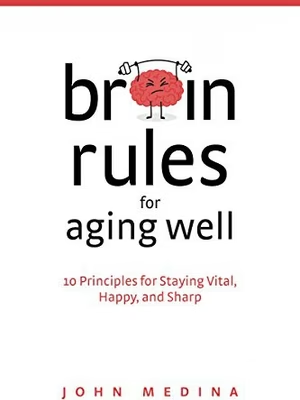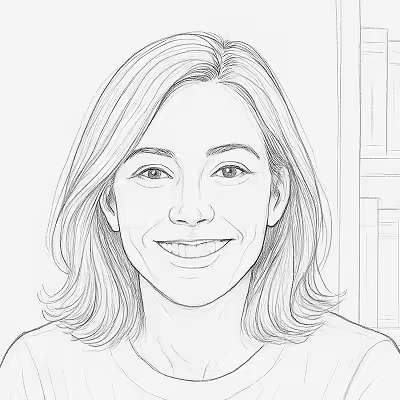Overview
We often think getting older means becoming forgetful, slow, and grumpy. John Medina argues that this doesn't have to be true. Brain Rules for Ageing Well explains that while our brains do change, they remain capable of learning and growing until the very end of our lives.
The book is organized into four main sections: Social, Thinking, Body, and Future. Medina uses humor and hard science to show that things like dancing with friends, reading books, and eating purple berries aren't just hobbies, they are medicine for your brain. If you want to know how to maintain your memory and mood as you age, this book is the manual.
My Take: The "Vitality Checklist"
Reading this book made me realize that "anti-aging" isn't about creams or pills; it's about daily habits. I developed a specific lens for this book that I call the "Vitality Checklist." Instead of trying to memorize all the science, I just look for three specific inputs every day: Connection, Challenge, and Movement.
Medina pushes hard on the idea that loneliness is physically dangerous. So, my take is simple: If you want to protect your brain, the most productive thing you can do is go for a walk with a friend. That one activity hits the three biggest "Brain Rules" (exercise, socialization, and stress reduction) all at once.
Key Takeaways
Socializing Is Not Optional
The biggest surprise in the book is that loneliness is toxic. Medina explains that your brain is designed to solve social problems. Isolating yourself damages your cognitive abilities as much as smoking damages your lungs. Keeping an active social circle is a survival strategy, not just a fun way to pass time.
Never "Retire" Mentally
The concept of "retirement", stopping work to do nothing, is dangerous for the brain. To stay sharp, you must keep facing new challenges. This doesn't mean you have to keep your 9-to-5 job, but you must keep learning new, difficult skills (like a language or teaching a class) to keep your neurons firing.
Optimism Fights Stress
Stress creates cortisol, which hurts the part of the brain responsible for memory (the hippocampus). Medina shows that cultivating optimism and gratitude actually lowers cortisol levels. Looking for the bright side isn't just "nice", it physically protects your brain structure.
Your Brain Needs Clear Arteries
What is good for the heart is good for the brain. Exercise and a proper diet (the MIND diet) keep blood vessels clear, allowing oxygen to reach the brain and help flush out toxins. If you stop moving, your brain literally starts to suffocate and accumulate "trash" (plaques).
Chapter-by-Chapter Summary
Rule 1: Your Friendships
Medina starts by explaining that the human brain evolved to interact with others. He highlights research showing that people with strong social networks live longer and have lower rates of dementia. The takeaway is simple: prioritize time with friends and family above almost everything else.
Rule 2: Your Happiness
This chapter focuses on the power of optimism. Medina distinguishes between "fake" positivity and genuine gratitude. He suggests that viewing aging as a time of wisdom rather than loss can actually improve your physical immune system and reduce stress hormones.
Rule 3: Your Stress
Here, Medina dives into the biology of stress. Chronic stress shrinks the hippocampus, the memory center of the brain. He offers practical ways to manage this, such as mindfulness and, surprisingly, helping others, which reduces your own stress levels.
Rule 4: Your Memory
This section debunks the idea that you can't teach an old dog new tricks. The brain is "plastic," meaning it can change and grow at any age. However, passive activities (like watching TV) don't help; you need active, novel learning challenges to build new neural pathways.
Rule 5: Your Sleep
Sleep changes as we age, becoming lighter and more fragmented. Medina explains that during deep sleep, the brain "washes" itself of toxins (amyloid beta) that cause Alzheimer's. He provides tips for better "sleep hygiene," like avoiding screens and keeping a routine.
Rule 6: Your Diet
Medina recommends the "MIND Diet," which is a mix of the Mediterranean and DASH diets. The focus is on leafy greens, nuts, fish, and berries. He specifically highlights how high sugar intake can damage the brain, while healthy fats protect it.
Rule 7: Your Exercise
If you could take one pill to fix aging, it would be aerobic exercise. Medina explains that walking briskly for just 30 minutes a few times a week improves executive function and memory. Movement increases blood flow, which feeds the brain the fuel it needs to survive.
Rule 8: Your Future (Retirement)
This chapter warns against the "cliff" of retirement where social contact and mental challenges suddenly drop to zero. Medina suggests a "gradual retirement" or finding a new, demanding purpose. The goal is to wake up with a problem to solve every day.
Rule 9: Your Past (Nostalgia)
Nostalgia isn't just living in the past; it's a cognitive tool. Medina explains that "reminiscence therapy", looking at old photos or listening to music from your youth, can boost mood and memory. It helps older adults maintain a sense of identity and self-worth.
Rule 10: Your Legacy
The final rule is about the "Grandmother Effect." Humans are unique in living long past our reproductive years, likely to help raise the next generation. Interacting with young people (grandkids or mentoring) provides a massive boost to an aging brain's vitality.
Main Concepts
The "Social Brain" Theory
A core concept in the book is that our brains are built for relationships. Medina points out that in the wild, a lonely human was a dead human. Today, loneliness triggers a "threat state" in the body, raising blood pressure and killing brain cells. This explains why socializing is often more effective than doing crossword puzzles for preventing dementia.
Aging with Neglect
- Sedentary lifestyle (sitting mostly)
- Social isolation and loneliness
- High sugar/processed food diet
- Belief that "I'm too old to learn"
- Irregular sleep patterns
- Retirement means "doing nothing"
Aging Well (Medina's Rules)
- Aerobic movement (walking/dancing)
- Strong, active friendships
- MIND Diet (berries, fish, greens)
- Constant new learning challenges
- Prioritizing deep sleep
- Retirement means "new purpose"
Neuroplasticity
Medina leans heavily on neuroplasticity, the brain's ability to rewire itself. He shares evidence that even in our 70s and 80s, we can grow new neurons in the hippocampus (neurogenesis). The catch? You have to use the brain. It operates on a "use it or lose it" basis. If you stop challenging yourself, the brain prunes away the connections it thinks you don't need.
How to Apply the Ideas This Week
You don't need to overhaul your whole life overnight. Medina is all about small habits that compound over time. Here are a few ways to start applying the Brain Rules this week:
- Schedule a "Walk and Talk." Combine exercise and socializing. Call a friend and ask them to go for a 30-minute walk. You get blood flow to the brain and the safety signal of connection.
- Eat a "Brain Bowl." Swap one meal or snack for brain-healthy foods. Try a bowl of blueberries and walnuts (both are stars of the MIND diet) instead of chips or cookies.
- Learn something frustrating. Pick a skill you are bad at, like dancing, a new card game, or a language app. If it feels easy, it’s not working. The frustration is the feeling of your brain building new muscles.
- Practice "Structured Nostalgia." Spend 10 minutes looking at photos from a happy time in your life 20+ years ago. Allow yourself to feel the good emotions; it acts as a natural stress-reducer.
Memorable Quotes
“The brain acts like a muscle: The more activity you do, the larger and more complex it can become.”
“Loneliness is a massive stressor. It’s not just a feeling; it’s a biological weapon.”
“Retirement is not the end of the road. It’s the beginning of the open road, but you have to drive the car.”
Who I Think Should Read This Book
- People approaching retirement: If you are about to leave the workforce, this book is essential for planning your mental and social future, not just your finances.
- Caregivers and adult children: If you are caring for aging parents, this book helps you understand what they are going through and how to support their brain health.
- Anyone over 40: You don't have to be "old" to start. The earlier you adopt these habits (especially sleep and diet), the better your protection against decline.
- Lifelong learners: If you are curious about neuroscience but hate dry textbooks, Medina’s writing style is funny, warm, and easy to understand.
What Other Readers Are Saying
Brain Rules for Ageing Well is widely appreciated for making complex science feel friendly. On Goodreads, it holds a rating of approximately 4.0 out of 5 stars. Readers often mention that they love Medina's humor and the practical "What do I do now?" summaries at the end of each chapter.
On Amazon, the book enjoys a rating of 4.5 out of 5 stars. Reviewers frequently call it "encouraging" and "hopeful." Some critical reviews mention that if you have read his first book (*Brain Rules*), a few concepts might feel familiar, but most agree the focus on aging brings enough new value to be worth the read.
-
Read reviews on Amazon:
Brain Rules for Ageing Well on Amazon
* Affiliate link. I earn from qualifying purchases.
- Read reviews on Goodreads: Brain Rules for Ageing Well on Goodreads
Final Thoughts
I used to think that my brain's health was mostly down to genetics, you either get lucky or you don't. Brain Rules for Ageing Well changed my mind. It showed me that while I can't control my genes, I have a huge amount of control over the environment I put my genes in.
The most empowering part of this book is the idea that it's never too late. Whether you are 45 or 85, your brain is still ready to grow new connections if you give it the right fuel. So, call a friend, eat some berries, and go for a walk. Your future self will thank you for it.
Ready to Boost Your Brain Health?
This summary covers the big ideas, but John Medina’s writing is full of fascinating stories and specific science that I couldn't fit here. If you want the full manual for your brain, grab a copy below.
Get Brain Rules for Ageing Well on Amazon* Affiliate link. I earn from qualifying purchases.

